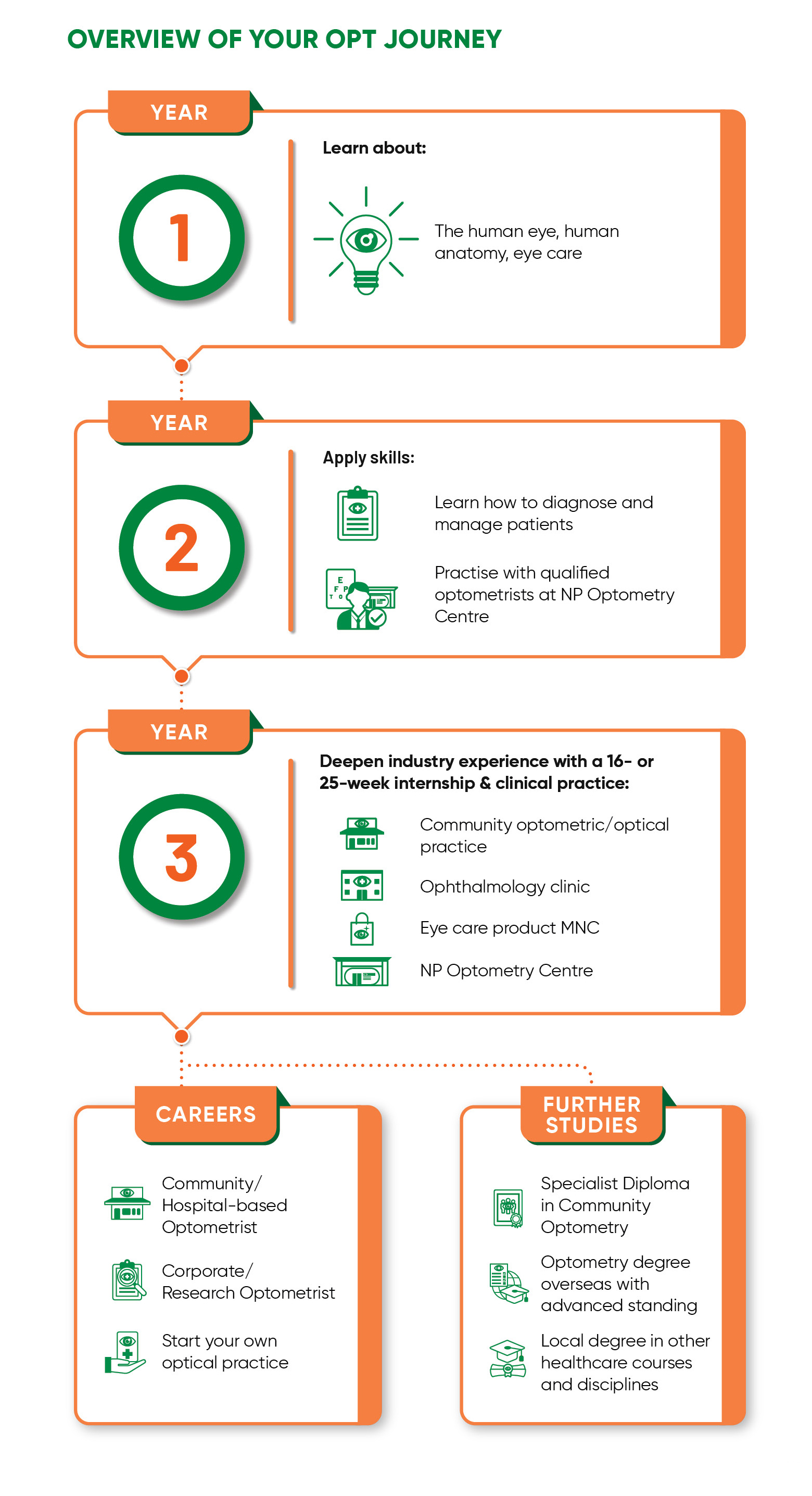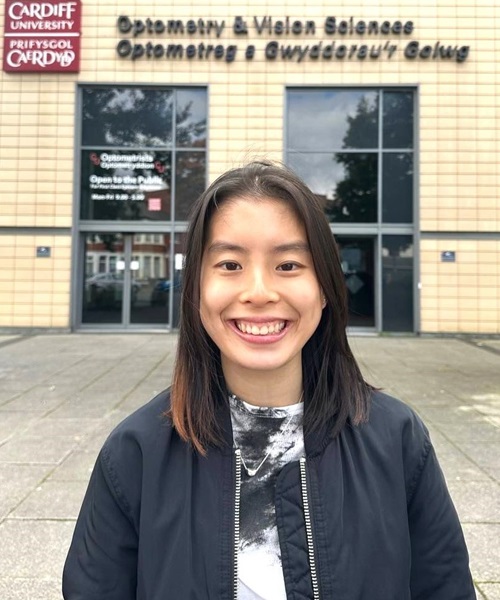Why OPT?
- Build strong industry relevance with curriculum co-designed, co-delivered or co-assessed by leading industry partners such as ZEISS
- Choose either a 16-week internship at two different settings or a 25-week local/overseas internship
- Gain future-ready skills that open doors to diverse opportunities
- Enjoy 100% employment rate in optometry-related jobs and attractive salaries in community optometry practices
About OPT
With an ageing population, rising rates of myopia, and more chronic diseases conditions like diabetes that can affect vision, the demand for quality eye care is growing. With our Diploma in Optometry (OPT), you will be equipped to make a real difference. Upon graduation, you can prescribe optical treatments as a registered optometrist. Plus, our broad-based curriculum opens doors to exciting opportunities beyond healthcare.
With myopia control management modules co-developed with ZEISS, you will learn how to manage myopia cases – particularly among children, but also in people of all ages. Beyond the core modules, you will dive into topics such as data analytics, biostatistics, and research methods, equipping you with a well-rounded foundation for the evolving eye care landscape.
Get ready for dynamic learning experiences with our tech tools, such as Gen AI, immersive games, and VR/ AR technology, to learn about eye conditions and understand how patients view the world.
Choose a 16-week placement in two different
workplaces, including an ophthalmology clinic, eye care
product company, or a community optometric practice.
Alternatively, you can explore various specialisations in
optometry – such as myopia management, education
and research –through a 25-week specialised
internship programme with multinational companies
like OWNDAYS and EssilorLuxottica, or an overseas
internship with ZEISS Vision Care.
Your learning will also be enriched by Overseas Immersion Programmes and Service-Learning trips.
The NP-ZEISS Management Suite at our Optometry Centre is where you will get hands-on experience with cutting-edge optometric instruments. Learn to use ZEISS’ complete range of digital eye examination equipment to monitor ocular health progression and myopia development. The new ZEISS MyoConsult platform will even prepare you to co-manage myopia with hospital-based eyecare practitioners, giving you an extra edge for career advancement in the optometric sector.
Overview of Your OPT Journey

Further Studies
Some of our Optometry graduates have progressed
to pursue healthcare-related degree courses or
even degrees in other disciplines such as arts,
social sciences, business administration, and
communications and new media at local universities.
As an Optometry graduate, you can also enrol in the
Specialist Diploma in Community Optometry offered
by NP or to pursue Optometry degree programmes at
universities such as:
Australia
- Queensland University of Technology
- University of New South Wales
New Zealand
- University of Auckland
United Kingdom
- Aston University
- Cardiff University
- Glasgow Caledonian University
- University of Manchester
Careers
As an Optometry graduate, you can land rewarding
roles in community-based optometry practices which
draw attractive salaries. Alternatively, you can also
work at ophthalmology clinics, eye care product
companies, research centres and hospitals.
You can explore roles such as:
- Community-Based Optometrist
- Lens Consultant
- Marketing and Customer Development Executive
- Professional Affairs Executive
- Research Optometrist
Entry Requirements
AGGREGATE TYPE ELR2B2-C
To be eligible for consideration, candidates must have the following GCE ‘O’ Level examination (or equivalent) results.
| Subject | 'O' Level Grade |
|---|---|
| English Language | 1-7 |
| Additional Mathematics/Mathematics | 1-6 |
Any one of the following subjects: | 1-6 |
Applicants must also fulfil the aggregate computation requirements for the ELR2B2-C Aggregate Type (English Language, 2 relevant subjects and 2 other best subjects) listed at www.np.edu.sg/docs/ELR2B2.pdf.
For students with other qualifications, please refer to the NP website for the entry requirements and admissions exercise period.
Candidates with severe vision deficiency or severe physical impairments may encounter difficulties meeting the course requirements and expectations. Please refer to the Optometrists & Opticians Board (OOB) Professional Practice Code and Guidelines on "Fitness to Practice" for guidance.
What You Will Learn
General Anatomy & Physiology (5 Credit Units)
This module provides students with foundational knowledge of the anatomy and physiology of the major human body systems. Students will learn the biochemistry processes in normal human physiology. The interrelationships of the body systems and how they maintain homeostasis are examined.
Geometrical & Physical Optics (5 Credit Units)
This module provides students with the knowledge of the behaviour of light and its interaction with matters. It also covers the optics of lenses, lens systems and aberrations, as well as photometry and laser. The basic concepts of refractive errors, including myopia, will be introduced to students.
Introduction to Data Analytics with Excel (2 Credit Units)
This module aims to provide students with a basic understanding of data analytics concepts and applications. Students will learn fundamental data analytics concepts, how to analyse data using Microsoft Excel and present information to provide insights for an informed decision making.
Ocular Anatomy & Physiology (5 Credit Units)
This module covers, in detail, the anatomy of the eye and its orbit. The anatomical relationships of the orbital contents including the extra-ocular muscles, orbital nerves, orbital blood vessels and ocular adnexa are described. Physiology and biochemistry of the principal constituents of the eye, including the cornea, crystalline lens, aqueous humour, vitreous humour, retina, ciliary apparatus and tear film are also covered. Additionally, accommodation & its impact on refractive errors, including myopia, will be introduced.
English Language Express* (Credit Units - NA)
English Language Express aims to give you a better grounding in the English Language and to strengthen the written and oral communications skills that you will need in your academic and professional careers. You will be engaged in writing, reading, listening and speaking activities that will develop your ability to speak and write grammatically, coherently and clearly. You will also hone your reading and listening comprehension skills.
Innovation Made Possible^ (3 Credit Units)
Underpinned by the Design Thinking framework, Innovation Made Possible aims to build creative confidence in students. The module will sensitize students to the process of user-centric problem solving and allow students to discover and hone their innate ability to think creatively, come up with innovations to tackle problems and explore new ideas for their studies and beyond.
^ Critical Core modules account for 10 credit units of the diploma curriculum. They include modules in innovation and world issues, as well as an interdisciplinary project. By bringing students from diverse diplomas together, the interdisciplinary project fosters collaboration to explore and propose solutions for real-world problems. NP aims to develop students to be agile and self-directed learners, ready for the future workplace.
General Pathology & Diseases (4 Credit Units)
This module equips students with knowledge of basic pathology which includes cell and tissue damage, genetic diseases, vascular disorders, tumours, inflammations, and infections with emphasis on microbiology. Students will learn common systemic diseases
such as diabetes, hypertension, and hyperlipidaemia which can cause complications in the eye.
Ocular Health Assessment & Disease Management 1 (5 Credit Units)
This module covers clinical optometric techniques such as slit-lamp bio-microscopy and keratometry in examining the anterior segment of the eyes. Students will learn to detect and manage anterior eye diseases based on assessment and interpretation with
these techniques.
Refraction (6 Credit Units)
This module focuses on clinical techniques of objective and subjective refraction using trial lenses on trial frame as well as with the phoropter. It also includes the clinical assessment of vision and visual acuity. Students will also be equipped with the knowledge of pathogenesis for the onset and progression of myopia.
Ophthalmic Optics & Dispensing (4 Credit Units)
This module equips students with knowledge of the types, materials, physical and optical properties of single vision lenses and spectacle frames available in the industry. Students will also be taught basic skills such as hand neutralisation, pupillary distance measurement, focimetry and related measurements in fitting lenses into frames. Principles and processes of lens coating, basic single vision ophthalmic lens glazing and myopia control ophthalmic lens types will also be covered.
Health & Wellness (1 Credit Unit)
This is a Level 1 Core module for all Year 1 students. The module will introduce students to the importance of maintaining both physical and mental health through the knowledge and monitoring of health indicators, and application through appropriate exercises. The aim of the module is to empower students with basic knowledge and skills to be independent and responsible in maintaining overall personal health.
Confident Communication: Find Your Voice (VOICE)^ (3 Credit Units)
The VOICE module aims to empower students to become thoughtful and confident communicators able to tailor a message to suit audience, purpose and context. Students will learn how to use storytelling structures and techniques, persuasive strategies and effective visuals to connect meaningfully with their audience. Through a personalised growth plan, the module encourages students to reflect, set goals and take ownership of their growth and development as communicators. The module employs engaging teaching strategies such as games, thinking routines, masterclasses and workshops, and a celebratory showcase festival at the end to make learning fun and exciting.
^ Critical Core modules account for 10 credit units of the diploma curriculum. They include modules in innovation and world issues, as well as an interdisciplinary project. By bringing students from diverse diplomas together, the interdisciplinary project fosters collaboration to explore and propose solutions for real-world problems. NP aims to develop students to be agile and self-directed learners, ready for the future workplace.
Ocular Health Assessment & Disease Management 2 (5 Credit Units)
This module covers the clinical optometric techniques direct and indirect ophthalmoscopy and emphasizes the detection and management of posterior eye diseases,
as well as ocular tumours and systemic diseases of the eye. The students will also be taught the ocular diseases that will occur as complications of myopia. In addition, students will be equipped with knowledge of ocular trauma, enabling them to differentiate
between ocular emergencies and non- emergencies for referrals.
Clinical Optometry & Communication (3 Credit Units)
This module trains students to perform clinical optometric tests necessary for a general eye examination. They are equipped with effective communication skills that include listening and responding, non-verbal communication, rapport building with patients and patient education to deliver effective patient care.
Contact Lens & Fitting 1 (5 Credit Units)
This module covers the designs, materials, care and maintenance of soft contact lenses that are available in the market. Students will learn the techniques of verification, insertion,
removal, and fit assessment of soft contact lenses. This module will also cover the detection, prevention and management of soft contact lens related complications.
Ophthalmic Dispensing & Prescribing (5 Credit Units)
This module equips students with the knowledge of prescribing and dispensing ophthalmic eyewear. Students will learn about different types of progressive and bifocal lens designs,
and advanced refraction procedures to prescribe appropriate ophthalmic eyewear. Students will also learn about the applications and principles of various specialty ophthalmic lenses and frame designs. This includes the use of multifocal and DIMs ophthalmic
lens to control myopia. The techniques of glazing and fitting of ophthalmic lenses, proper ophthalmic dispensing procedures and troubleshooting will be covered in this module.
Visual Perception & Instrumentation (5 Credit Units)
This module studies the eye and the visual pathway as a system to perceive vision and includes the topics of visual resolution, spatial, motion, depth, and colour perception,
contrast sensitivity, visual fields, and entoptic phenomena. It also covers the principles of psychophysical methods in studying the visual system. Students will learn to use various instruments to assess and interpret colour vision, visual fields,
and contrast sensitivity.
World Issues: A Singapore Perspective^ (2 Credit Units)
^ Critical Core modules account for 10 credit units of the diploma curriculum. They include modules in innovation and world issues, as well
as an interdisciplinary project. By bringing students from diverse diplomas together, the interdisciplinary project fosters collaboration to explore and propose solutions for real-world problems. NP aims to develop students to be agile and self-directed
learners, ready for the future workplace.
Contact Lens & Fitting 2 (5 Credit Units)
This module covers the designs, materials, and the care and maintenance for rigid gas permeable (RGP) contact lenses that are available in the market. Students will learn the techniques of verification, perform preliminary assessment to establish patient suitability as well as techniques of insertion, removal, and fit assessment of RGP contact lenses. This module will also cover the detection, prevention, and management of RGP contact lens related complications. In addition, students will be introduced concepts of the effects of optical differences between contact lenses and spectacles and provides practical application of presbyopia and myopia management in contact lenses.
Biostatistics & Research Methods (4 Credit Units)
This module starts with basic statistics and progress to include probability and statistical inference. Students will also learn the basic processes and principles applied in research, as well as how to conduct literature reviews.
Introduction to Optometric Practice (6 Credit Units)
This module provides training of students in hands-on clinical practice in patient examination, with emphasis on history taking, refraction, slit-lamp biomicroscopy and direct ophthalmoscopy, prescribing and dispensing of optical aids.
Binocular & Paediatric Vision (5 Credit Units)
This module teaches the fundamental concepts of vision development and binocular vision. It covers the assessment, diagnosis and management of paediatric eye conditions and binocular vision anomalies. The module will also cover evidence-based strategies to control myopia in young children.
Communication in Optometric Practice (2 Credit Units)
This module equips students with effective communication skills that include listening and responding, non-verbal communication, rapport building with patients, patient education, as well as interdisciplinary interactions and communications. Students
can practice their interpersonal, collaborative, and professional communication skills during attachments and internship.
OPT Specialised Internship Programme (New) (25 Credit Units)
In this module, students are attached to organisation(s) for an extended period of 25 weeks. This provides opportunities for students to experience managing patients who require eye care, optical aids/specialty lenses or to conduct research in a realistic work environment. The students will learn the operations of an optical, optometric or ophthalmology practice, as well as how to interact with the supervisor and colleagues. Additionally, students will undergo hands-on practices to hone their clinical skills, including contact lens fitting.
4-month Internship (16 Credit Units)
This module schedules students to be attached to two different optometric practice, which consists of optometric retail shops, eye clinics and hospitals which allow for experience in dealing with patients requiring eye care and optical aids in a realistic working environment. The students will learn the operation of an optical shop/ eye clinic, a hospital organization, as well as how to interact with supervisor and colleagues.
Integrated Optometric Practice (9 Credit Units)
This module provides training of students in hands-on clinical practice in patient examination, case analysis, patient management, and ophthalmic dispensing. It will include pachymetry and topics related to various refractive surgeries. It also provides basic hands-on clinical practice and knowledge on contact lens preliminary ocular assessment, contact lens fitting, contact lens delivery and aftercare for single vision and presbyopic patients. It also includes the determination of patient suitability of contact lenses, and deciding the best suited lenses for patients.
This module provides continued training of students in hands-on clinical practice in patient examination, case analysis, management including paediatric and special cases. It will include introduction to more advanced techniques of angiography, ultrasonography, electrophysical tests and optical coherence tomography. Additionally, students will get hands on training on fitting & troubleshooting of myopia control products.
Advanced Contact Lens Practice (5 Credit Units)
This module continues to provide students with hands-on clinical practice on fitting of contact lens and contact lens patient management for single vision and presbyopic patient. It also covers more advanced contact lens related content such as keratoconus, orthokeratology and post-refractive surgery fitting. Additionally, students will get hands on training on fitting & troubleshooting of myopia control contact lenses.
Optometric Practice Management & Ethics (2 Credit Units)
This module covers the basic concepts in operations, inventory control, marketing, people and service management, and finance in an optometry retail outlet. Students will learn about sales and marketing, how to develop a business plan, as well as basic
accounting. This module also covers the legal and ethical responsibilities of optometrists as well as other eye care professionals during practice.
Healthcare Career & Professional Preparation (Optometry) (3 Credit Units)
The module is delivered over three years and prepares students for the optometry course with the end in mind, through guided reflection of their personal characteristics, and producing an overall game plan for their future education and career goals.
It also aims to deepen students’ commitment to the optometry and optical industry. Students will be equipped with skills necessary to seek and secure work.
Ophthalmic Pharmacology (2 Credit Units)
Students will learn the fundamental principles of pharmacology and how these are relevant in the prevention and treatment of eye conditions and diseases including pharmacological approaches for myopia control.
Project ID: Connecting the Dots^ (4 Credit Units)
^ Critical Core modules account for 10 credit units of the diploma curriculum. They include modules in innovation and world issues, as well as an interdisciplinary project. By bringing students from diverse diplomas together, the interdisciplinary project fosters collaboration to explore and propose solutions for real-world problems. NP aims to develop students to be agile and self-directed learners, ready for the future workplace.




